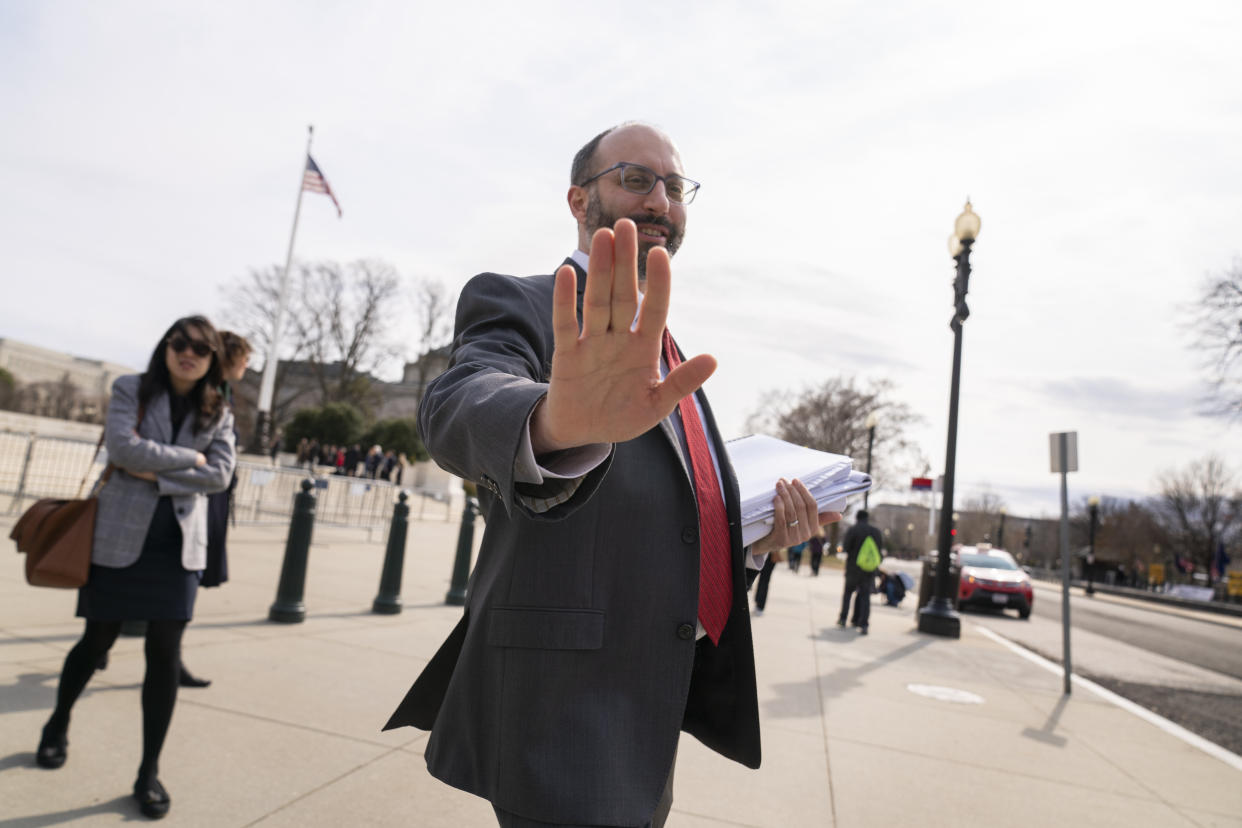Prosecutor connected to Jan. 6 probe takes on lawyer for tech companies in mystery appeals court fight

- Oops!Something went wrong.Please try again later.
A Justice Department attorney who works closely with the special counsel probing Jan. 6 took on a prominent lawyer — who primarily defends social media companies — in a sealed appeals court argument Friday, according to a review of court records.
Ari Holtzblatt, an attorney with the high-powered firm WilmerHale — who has most recently represented Twitter, Google and Meta — argued against Justice Department trial attorney James Pearce, according to filings lodged with the federal D.C. Circuit Court of Appeals. Holtzblatt has most frequently represented Twitter in recent months, including in a Supreme Court case in February that resulted in a significant victory for the social media company earlier this week. Pearce is among the DOJ prosecutors working closely with special counsel Jack Smith’s team.
Holtzblatt was spotted by a POLITICO reporter at the federal courthouse, along with other attorneys from WilmerHale, on Friday morning. Among them was Aaron Zebley, once a top deputy to special counsel Robert Mueller, and George Varghese, a former federal prosecutor. Varghese now handles national security matters at Wilmer, according to his bio with the firm.
The precise nature of the litigation is unclear. However, docket entries connected to the case suggest it has been ongoing for months, one of a growing list of secret battles Smith has waged to secure testimony and documents in his probes of Donald Trump. Smith has won similar fights to secure testimony from key members of Trump’s inner circle, including former vice president Mike Pence, former chief of staff Mark Meadows and Trump social media manager Dan Scavino.
But the nature of the secretive fight against Holtzblatt and his client has been difficult to pinpoint, identifiable only by a series of clues on the appeals court docket. Several days prior to Friday’s oral argument, the circuit asked lawyers for both sides of the dispute to identify who would participate in oral arguments. The government indicated that Pearce — who has handled a slew of high-level Jan. 6 legal fights — would lead arguments for the Justice Department. WilmerHale didn’t publicly identify its role in the proceedings, information filed in response to the circuit’s request hinted at Holtzblatt’s role. Holtzblatt and a spokesperson for Smith declined to comment, and spokespeople for WilmerHale did not immediately respond to requests for comment.
The closed-door argument was slated to run for 30 minutes, but it took more than two hours for the lawyers to emerge. A court clerk and a security officer stood by just outside the fifth-floor D.C. Circuit courtroom as the arguments progressed.
The judges who heard the matter were Cornelia Pillard, an appointee of President Barack Obama, along with Michelle Childs and Florence Pan, appointees of President Joe Biden.
The appeals court docket indicates that the litigation was initiated on Jan. 5 before U.S. District Court Judge Beryl Howell, who was then the district’s chief judge, tasked with overseeing all matters connected to Smith’s grand jury. Howell ruled in favor of the Justice Department on March 3, prompting a quick appeal and an emergency motion to stay her decision. The same three appeals judges briefly halted Howell’s order before deciding on March 23 to reject the stay request.
Despite Smith’s apparent win, the case moved forward toward oral arguments. Notably, the district court docketed the matter as a “stored communications” fight, which typically references an effort by prosecutors to obtain communications from third-party sources like telecom providers or social media companies like Google, Twitter and Facebook.
The secrecy and speed with which the matter has moved is also comparable to the speed with which the appeals court — typically a slow-moving body — has treated the grand jury fights related to Trump.

